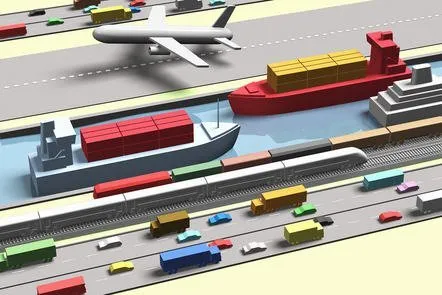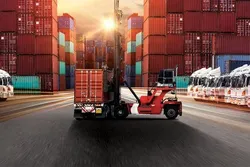
International Logistics: An Introduction 
This course provides an introduction to international logistics, exploring the opportunities and challenges involved. You will learn about the main concepts and activities of international logistics, potential advantages and risks, and how to ensure logistics quality. It is designed for business professionals looking to develop their understanding of international logistics and its concepts. ▼
ADVERTISEMENT
Course Feature
![]() Cost:
Cost:
Free
![]() Provider:
Provider:
Futurelearn
![]() Certificate:
Certificate:
Paid Certification
![]() Language:
Language:
English
![]() Start Date:
Start Date:
17th May, 2021
Course Overview
❗The content presented here is sourced directly from Futurelearn platform. For comprehensive course details, including enrollment information, simply click on the 'Go to class' link on our website.
Updated in [May 25th, 2023]
This course provides an introduction to international logistics, exploring the opportunities and challenges involved. Participants will gain an understanding of the main concepts and activities of international logistics, and learn how to ensure logistics quality and evaluate quality as a logistical objective and requirement. This course is designed for business professionals looking to develop their understanding of international logistics and its concepts.
[Applications]
Upon completion of this course, participants will be able to apply their knowledge to their own business operations. They will be able to identify and assess the opportunities and challenges of international logistics, and develop strategies to ensure quality and efficiency in their logistics operations. Participants will also be able to evaluate the potential risks of international logistics and develop strategies to mitigate them.
[Career Paths]
1. International Logistics Manager: International logistics managers are responsible for overseeing the movement of goods and services across international borders. They must be knowledgeable in customs regulations, international trade laws, and shipping procedures. They must also be able to develop and maintain relationships with suppliers, customers, and other stakeholders. As the global economy continues to expand, the demand for international logistics managers is expected to grow.
2. Supply Chain Analyst: Supply chain analysts are responsible for analyzing and optimizing the flow of goods and services within a company’s supply chain. They must be knowledgeable in supply chain management, logistics, and data analysis. They must also be able to develop and maintain relationships with suppliers, customers, and other stakeholders. As companies continue to focus on streamlining their supply chains, the demand for supply chain analysts is expected to grow.
3. Logistics Coordinator: Logistics coordinators are responsible for coordinating the movement of goods and services within a company’s supply chain. They must be knowledgeable in logistics, transportation, and customer service. They must also be able to develop and maintain relationships with suppliers, customers, and other stakeholders. As companies continue to focus on streamlining their supply chains, the demand for logistics coordinators is expected to grow.
4. International Trade Specialist: International trade specialists are responsible for managing the import and export of goods and services across international borders. They must be knowledgeable in international trade laws, customs regulations, and shipping procedures. They must also be able to develop and maintain relationships with suppliers, customers, and other stakeholders. As the global economy continues to expand, the demand for international trade specialists is expected to grow.
[Education Paths]
1. Bachelor of Science in Logistics and Supply Chain Management: This degree program provides students with a comprehensive understanding of the principles and practices of logistics and supply chain management. Students will learn about the fundamentals of logistics, including inventory management, transportation, and warehousing. They will also gain an understanding of the global supply chain, including international trade regulations, customs, and logistics operations. This degree program is ideal for those looking to pursue a career in logistics and supply chain management.
2. Master of Science in Logistics and Supply Chain Management: This degree program provides students with an advanced understanding of the principles and practices of logistics and supply chain management. Students will learn about the fundamentals of logistics, including inventory management, transportation, and warehousing. They will also gain an understanding of the global supply chain, including international trade regulations, customs, and logistics operations. This degree program is ideal for those looking to pursue a career in logistics and supply chain management.
3. Doctor of Philosophy in Logistics and Supply Chain Management: This degree program provides students with an in-depth understanding of the principles and practices of logistics and supply chain management. Students will learn about the fundamentals of logistics, including inventory management, transportation, and warehousing. They will also gain an understanding of the global supply chain, including international trade regulations, customs, and logistics operations. This degree program is ideal for those looking to pursue a career in logistics and supply chain management.
4. Master of Business Administration in Logistics and Supply Chain Management: This degree program provides students with a comprehensive understanding of the principles and practices of logistics and supply chain management. Students will learn about the fundamentals of logistics, including inventory management, transportation, and warehousing. They will also gain an understanding of the global supply chain, including international trade regulations, customs, and logistics operations. This degree program is ideal for those looking to pursue a career in logistics and supply chain management.
The development trends in the field of logistics and supply chain management are rapidly changing. With the rise of e-commerce, the need for efficient and cost-effective logistics and supply chain management is becoming increasingly important. As a result, there is a growing demand for professionals with the skills and knowledge to manage the complexities of the global supply chain. Additionally, the use of technology in logistics and supply chain management is becoming increasingly important, as companies look to automate processes and reduce costs.
Course Provider

Provider Futurelearn's Stats at AZClass
Discussion and Reviews
0.0 (Based on 0 reviews)
Explore Similar Online Courses

Building Desktop Apps with Ionic and Electron

1 Hour Ashtanga Yoga Class (Honor and Respect)

Python for Informatics: Exploring Information

Social Network Analysis

Introduction to Systematic Review and Meta-Analysis

The Analytics Edge

DCO042 - Python For Informatics

Causal Diagrams: Draw Your Assumptions Before Your Conclusions

Whole genome sequencing of bacterial genomes - tools and applications

Simulation for Logistics: An Introduction

Sustainability and Green Logistics: An Introduction


Start your review of International Logistics: An Introduction